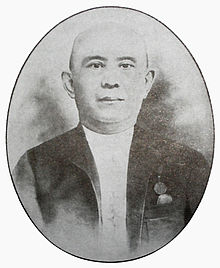Lie Kim Hok
| Lie Kim Hok | |
|---|---|

Lie, c. 1900
|
|
| Born |
1 November 1853 Buitenzorg, Dutch East Indies (modern Bogor, West Java, Indonesia) |
| Died | 6 May 1912 (aged 58) Batavia, Dutch East Indies (modern Jakarta, Indonesia) |
| Cause of death | Typhus |
| Occupation | Writer, journalist |
| Years active | 1870s–1912 |
| Notable work | |
| Style | Realism |
| Spouse(s) |
|
| Children | 4 |
Lie Kim Hok (Chinese: 李金福; pinyin: Lǐ Jīnfú; 1 November 1853 – 6 May 1912) was a peranakan Chinese teacher, writer, and social worker active in the Dutch East Indies and styled the "father of Chinese Malay literature". Born in Buitenzorg (now Bogor), West Java, Lie received his formal education in missionary schools and by the 1870s was fluent in Sundanese, vernacular Malay, and Dutch, though he was unable to understand Chinese. In the mid-1870s he married and began working as the editor of two periodicals published by his teacher and mentor D. J. van der Linden. Lie left the position in 1880. His wife died the following year. Lie published his first books, including the critically acclaimed syair (poem) Sair Tjerita Siti Akbari and grammar book Malajoe Batawi, in 1884. When van der Linden died the following year, Lie purchased the printing press and opened his own company.
Over the following two years Lie published numerous books, including Tjhit Liap Seng, considered the first Chinese Malay novel. He also acquired printing rights for Pembrita Betawi, a newspaper based in Batavia (now Jakarta), and moved to the city. After selling his printing press in 1887, the writer spent three years working in various lines of employment until he found stability in 1890 at a rice mill operated by a friend. The following year he married Tan Sioe Nio, with whom he had four children. Lie published two books in the 1890s and, in 1900, became a founding member of the Chinese organisation Tiong Hoa Hwe Koan, which he left in 1904. Lie focused on his translations and social work for the remainder of his life, until his death from typhus at age 58.
...
Wikipedia
